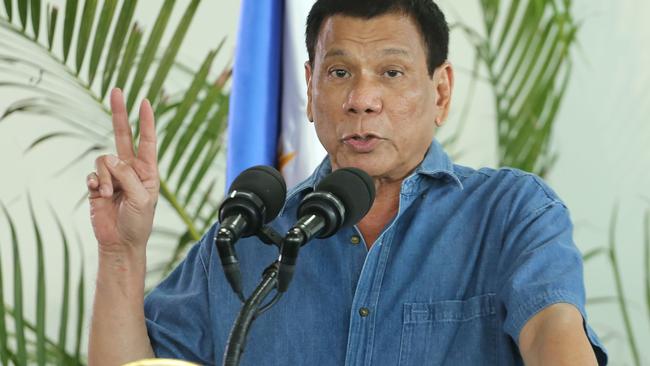
Philippines President Rodrigo Duterte’s dramatic pivot to China is the most serious setback to the US’s position in Southeast Asia since the fall of Saigon to the communists in April 1975.
It gravely weakens the US alliance system in Asia, which is the bedrock of Australian security. It is a direct result of the near-total failure of every foreign policy initiative of Barack Obama’s second term over the past four years.
China, Russia and Iran now are acting as classical revisionist powers, sharply and dangerously extending their respective spheres of influence in response to Obama’s growing weakness.
Duterte’s comments on America, echoed increasingly by his cabinet secretaries, surely indicate the strong possibility of a profound shift in The Philippines’ strategic orientation.
If the US loses The Philippines, its oldest and in some ways closest Asian partner, Obama’s Asia pivot is a total bust and the region’s underlying security system will be severely undermined.
In Beijing at the end of last week, Duterte declared: “In this venue, I announce my separation from the United States.”
“America has lost now, and maybe I will also go to Russia to talk to Putin and tell him there are three of us against the world: China, Philippines and Russia. It’s the only way.”
Earlier, he had referred to Obama as a “son of a whore”, which led to the US cancelling a meeting between the two leaders.
Duterte and Foreign Secretary Perfecto Yasay have been rousing anti-American nationalist sentiments based on US military atrocities committed more than a century ago when Washington ruled The Philippines.
He has called for an end to joint naval patrols, called for US troops to leave Mindanao where they help in anti-terrorist campaigns, and said he would review the 2014 Enhanced Defence Co-operation Agreement.
These statements can no longer be dismissed as wild rhetoric.
The US lost its old Philippines bases — Subic Bay and Clark Air Field — in a Philippines Senate vote in 1992, but then they were of no military consequence. It now has no permanent bases in The Philippines, but has five facilities at which it rotates from virtually at will, including one at Palawan near the disputed Scarborough Shoals, which Beijing occupied after forcibly evicting The Philippines Navy.
In July, the previous administration won what seemed a decisive victory at the Permanent Court of Arbitration, which ruled Beijing had no claim to these reefs and had violated other nations’ rights.
The US is active in the South China Sea, partly to support Southeast Asian nations that claim sovereignty over different outcrops and that have been bullied by China, which claims virtually all the South China Sea.
Duterte seems to have made the following calculation: the Scarborough Shoals won’t provide jobs for The Philippines. If he gives in to Beijing, without formally conceding sovereignty, he will be rewarded with Chinese loans and investments, and Beijing will not criticise him for extrajudicial killings in his anti-drugs campaign.
Obama is not managing his alliances. He neither rewards friends nor penalises enemies. He is a symbol of strategic impotence.
Beijing offers unqualified political support and substantial money. Duterte signed trade, investment and loan deals worth $30 billion in Beijing.
After the international court ruling, Obama did virtually nothing. His administration has run just four freedom-of-navigation exercises in the South China Sea, some involving a single US ship. When Beijing wanted to demonstrate its naval capabilities in the South China Sea, it sent 200 ships.
All Obama’s foreign policy initiatives have collapsed: the reset with Russia; the deal with Iran; the bombing of Libya; the leading from behind in Syria. He has lost allies and influence while Moscow, Tehran and Beijing have emphasised what they can do for their allies — and their enemies.
The underlying US position in The Philippines is strong, with massive US investment and deep military co-operation. But Obama’s inattention and fecklessness may have thrown it all away in a humiliating defeat.
We still have nearly three months of Obama in his lame-duck phase and it will be some months again before the next president, presumably Hillary Clinton, can get her administration together and try to retrieve the mess. This is an intensely dangerous few months for all nations who rely on the US alliance system for security.




To join the conversation, please log in. Don't have an account? Register
Join the conversation, you are commenting as Logout